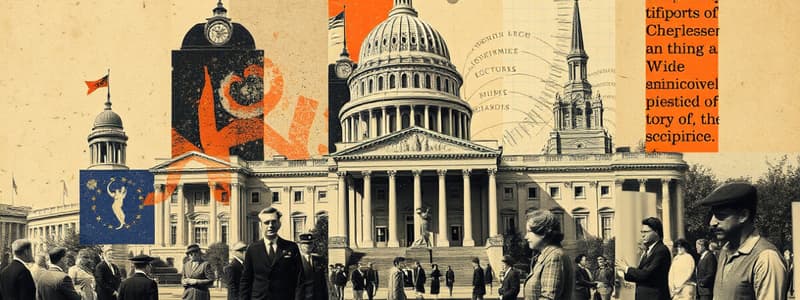Podcast
Questions and Answers
What is Political Efficiency?
What is Political Efficiency?
The belief that citizens have the ability to affect government and politics.
Define Government.
Define Government.
The formal institutions and procedures through which a territory and its people are ruled.
What is Autocracy?
What is Autocracy?
A form of government in which a single individual rules supreme.
What is Oligarchy?
What is Oligarchy?
What is Democracy?
What is Democracy?
Define Constitutional Government.
Define Constitutional Government.
What characterizes Authoritarian Government?
What characterizes Authoritarian Government?
Define Totalitarian Government.
Define Totalitarian Government.
What is Politics?
What is Politics?
Define Power in a governmental context.
Define Power in a governmental context.
What is Representative Democracy (Republic)?
What is Representative Democracy (Republic)?
What is Direct Democracy?
What is Direct Democracy?
Define Pluralism.
Define Pluralism.
What is Political Culture?
What is Political Culture?
Define Liberty in terms of government.
Define Liberty in terms of government.
What is Limited Government?
What is Limited Government?
Define Laissez-faire Capitalism.
Define Laissez-faire Capitalism.
What does Equality of Opportunity mean?
What does Equality of Opportunity mean?
Define Political Equality.
Define Political Equality.
What is Popular Sovereignty?
What is Popular Sovereignty?
Flashcards are hidden until you start studying
Study Notes
Political Concepts and Government Types
- Political Efficiency: Citizens believe they can influence government and political processes, highlighting the importance of civic engagement.
- Government: Comprises formal institutions and procedures governing a territory and its people.
- Autocracy: Power resides with a single ruler (e.g., king, queen, dictator), with no meaningful opposition.
- Oligarchy: A small group, such as landowners or wealthy merchants, makes most governing decisions, limiting broader participation.
- Democracy: Citizens significantly participate in government through the election of key officials, fostering representation.
- Constitutional Government: Operates under an established framework that limits government powers and establishes legal bounds.
- Authoritarian Government: Lacks formal constraints on power but may be moderated by societal institutions.
- Totalitarian Government: Recognizes no limits to its authority, attempting to suppress or eliminate rival social organizations.
Political Processes and Participation
- Politics: Involves conflict regarding leadership, government structure, and policy-making.
- Power: Refers to influence over governmental decisions, leadership, and organization.
- Representative Democracy (Republic): Citizens elect representatives who make significant governmental decisions on their behalf.
- Direct Democracy: Citizens vote directly on laws and policies, ensuring their voices participate directly in governance.
- Pluralism: Encourages competition among diverse interests in governance, leading to compromise and moderation.
Fundamental Political Values
- Political Culture: Characterized by shared values and beliefs about government; American culture emphasizes liberty, equality, and democracy.
- Liberty: The principle of freedom from government control, a foundational aspect of individual rights.
- Limited Government: A constitutional system where governmental powers are explicitly defined and restricted.
- Laissez-faire Capitalism: An economic model where production and distribution are privately controlled with minimal government interference.
- Equality of Opportunity: The belief that everyone should have the freedom to utilize their talents to achieve personal potential.
- Political Equality: Ensures equal participation in politics, underscored by the principle of "one person, one vote."
- Popular Sovereignty: Emphasizes that political authority ultimately resides with the people, a key democratic principle.
Studying That Suits You
Use AI to generate personalized quizzes and flashcards to suit your learning preferences.




